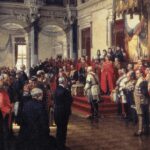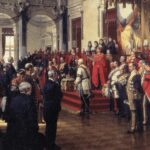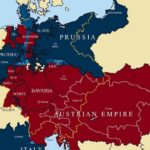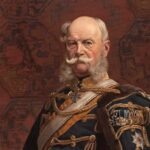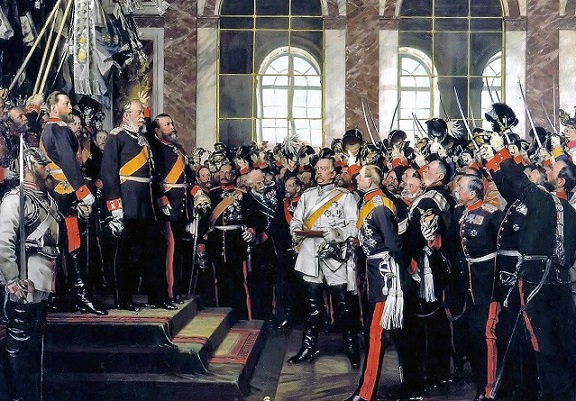
The unification of Germany was not finalized in Berlin or Frankfurt but in a hall of mirrors just outside Paris. On January 18, 1871, in the glittering Hall of Mirrors at the Palace of Versailles, a new empire was born. The event symbolized not only the triumph of Prussia over France but the realization of a centuries-old dream – a unified German state.
The Proclamation of the German Empire marked the culmination of decades of war, diplomacy, and political maneuvering led by Otto von Bismarck. It reshaped European politics, solidified Prussian dominance, and gave rise to a new continental power that would define the next century. But this moment was more than a political shift – it was an act of symbolism, nationalism, and theater. This article explores what led to the proclamation, what happened that day in Versailles, and why it matters so deeply in modern history.
Background: The Road to Unification
Before 1871, “Germany” was a geographic expression more than a political entity. It was made up of dozens of sovereign kingdoms, duchies, and free cities loosely associated through the German Confederation. The dissolution of the Holy Roman Empire in 1806 had left the German world fragmented.
The push toward unity intensified after the Austro-Prussian War of 1866, which saw Prussia assert dominance over northern German states. Bismarck, the cunning Prussian Chancellor, envisioned a Germany without Austrian influence – a “Kleindeutschland” model. He unified the northern states under the North German Confederation and deliberately isolated France diplomatically.
The final catalyst came with the Franco-Prussian War (1870–71). Southern German states like Bavaria, Württemberg, and Baden were persuaded to ally with Prussia. Their victories over France, especially at the Battle of Sedan, created the momentum needed to fully unify the German-speaking lands. With France defeated and Paris under siege, the time was right to declare a new German Empire.
The Event: January 18, 1871 at Versailles
On a cold winter morning, German princes, generals, and dignitaries gathered inside the opulent Hall of Mirrors at Versailles, a palace that had long symbolized French royal glory. There, amidst murals celebrating the Sun King’s power, the leaders of the fragmented German states came together in an act of unity.
King Wilhelm I of Prussia was proclaimed German Emperor (Kaiser) by the assembled leaders. It was a carefully staged ceremony, orchestrated by Bismarck, who stood in the crowd in a white military uniform – a stark contrast to his usual black.
The symbolism was intentional. By proclaiming the empire in Versailles, Bismarck sent a message to France and the world – Germany was no longer a collection of bickering states. It was a single empire, strong and sovereign, born not through treaties but through victory.
No crown was placed on Wilhelm’s head. The ceremony was more political than royal. Still, the implications were clear – a new power had risen in Europe, and it would be led not by a consensus of states but by Prussian military and political authority.
The New German Empire: Structure and Power
The newly formed German Empire was a federal monarchy made up of 25 states, including four kingdoms – Prussia, Bavaria, Saxony, and Württemberg. It also included grand duchies, duchies, principalities, and free cities like Hamburg and Bremen.
Though it was technically a federation, the empire was dominated by Prussia:
- Wilhelm I became Emperor, but remained King of Prussia.
- Bismarck was named Imperial Chancellor, with real power over domestic and foreign policy.
- The Reichstag, an elected parliament, had limited authority compared to the Bundesrat, which represented state governments but was heavily influenced by Prussia.
The empire had a unified currency, legal system, and military – but states retained control over education, policing, and local administration. It was a hybrid model that balanced tradition with central authority.
Reaction and Significance
The proclamation was met with a wave of celebration across German territories. Newspapers hailed the event as the fulfillment of a historic destiny. Citizens took to the streets. Church bells rang out, and toasts were made in beer halls and aristocratic salons alike.
Yet not everyone celebrated. Some German liberals were wary of the imperial character of the new state, fearing it would prioritize militarism over democracy. Socialists and republicans, though few, worried about authoritarian rule.
Internationally, the reaction was mixed. Britain observed with caution. Austria, having been excluded, watched uneasily. France was humiliated. The loss of Alsace-Lorraine and the use of Versailles as the location for the proclamation were seen as national insults that would fester for decades.
The proclamation was not just the conclusion of German unification – it was the beginning of German Empire-building. It altered the balance of power in Europe, created new diplomatic tensions, and planted seeds that would grow into the crises of the 20th century.
Cultural and Symbolic Legacy
The Hall of Mirrors became more than a French treasure – it became the birthplace of modern Germany. Paintings, photographs, and engravings immortalized the moment. Schools taught the date as a milestone. Monuments were erected. The Victory Column in Berlin, though built earlier, became closely associated with this unification triumph.
In Versailles, the symbolism would come full circle. In 1919, after World War I, the Treaty of Versailles was signed in the same hall – this time with Germany as the defeated party. What had once been a stage for triumph became one of humiliation.
Still, the legacy of 1871 persisted. The concept of a united Germany under one crown, one flag, and one government became the foundation of the German national identity.
The Proclamation of the German Empire in 1871 was more than a ceremonial act – it was the culmination of a decades-long struggle for unity and identity. It represented a turning point not only for Germany but for Europe as a whole. By combining political will, military success, and symbolic theater, Bismarck and Wilhelm I created a new force in European affairs.
This moment in the Hall of Mirrors marked the end of one era and the beginning of another. It was the moment when Germany went from idea to empire – and from scattered voices to a single, powerful chorus.
Explore more on German unification:
- The Franco-Prussian War (1870–71)
- 19th Century and German Unification
- Otto von Bismarck and Realpolitik
- The Austro-Prussian War (1866)
- [19th Century and German Unification]
- [German Nationalism in the 19th Century]

